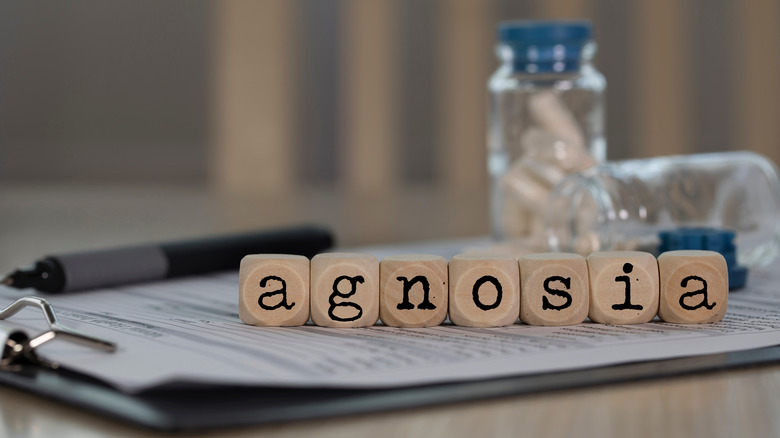Warning Signs Of Alzheimer's Disease You Should Never Ignore
When we think of Alzheimer's disease, we often think of memory loss. But this is just one of the many signs of the onset and progression of the illness. Alzheimer's is a neurodegenerative disorder and the most common form of dementia that causes the brain to slowly shrink and break down (via National Institute on Aging). Unlike many other terminal diseases, Alzheimer's wears away at an individual's remembering self, pulling apart the memories that hold together their personality. The illness destroys the ability to think and reason to such a degree that it can eventually interfere with daily life, stripping a person of their independence and the ability to care for themselves.
Alzheimer's is a puzzling condition in that the early signs can present differently for different people (per the National Institute of Aging). Paying attention to its symptoms can help doctors better understand how to treat the illness and give patients and families time to plan for the future. Here are some possible indicators of Alzheimer's disease that shouldn't be ignored.
Confusion
In the early stages of Alzheimer's, people usually function as normal, but they may begin to exhibit increased confusion, notes the Alzheimer's Association. This is often mild at first; however, it can serve as a warning sign of the condition. In the later stages, the sense of disorientation grows stronger. People may muddle up places and dates, or lose track of what season or year it is, becoming more and more confused about the passage of time. They can even become puzzled about where they are or how they got there. Frequent confusion can significantly affect a person's life, making them feel powerless, agitated, stressed, and out of control.
It's estimated that around 89% of patients with Alzheimer's experience delirium, which is characterized by sudden confusion, inattention, and disorganized thinking (via the American Academy of Neurology). It often includes altered states of consciousness too, reports a study published in the Journal of Gerontological Nursing. Delirium is highly prevalent among people with Alzheimer's who are hospitalized, but it can also frequently occur among community-dwelling individuals. Delirium may require immediate medical attention and shouldn't go overlooked.
Forgetfulness
Loss of memory is one of the first symptoms reported by patients with Alzheimer's disease. It tends to creep in early, manifesting in small ways for a while, explains the Alzheimer's Association website. People may repeatedly forget where they parked their car or the name of an acquaintance. It can take them longer to remember things in general. Over time, however, forgetfulness becomes more frequent and distressing. A person may struggle to recognize a close friend or family member, and they might even forget the function of a familiar object.
Memory changes are sometimes a natural part of aging. The type of forgetfulness that's indicative of Alzheimer's tends to be more chronic and progressive, with memory deteriorating rapidly as time goes on, explains a study published in the journal Dialogues in Clinical Neuroscience. Over time, people with Alzheimer's lack awareness of immediate experiences and struggle to recall past experiences. This is caused by cumulative damage to brain cells, also known as atrophy, where certain regions involved in memory consolidation, such as the hippocampus, waste away. Both working memory and long-term declarative memory are compromised early on in Alzheimer's and during the course of the disease.
Losing or misplacing things
People with Alzheimer's often lose or misplace things as a result of memory loss, notes the Alzheimer's Society. This can show up in small ways that seem like normal aging at first. For example, they may forget where they left their keys or glasses. But as the disease progresses and spreads to other parts of the brain, the tendency to lose things can start to affect an individual's daily functioning. Some people can even hide or hoard things and put them in strange places. As these incidents occur more frequently and it gets harder for people to retrace their steps, it could be a signal that something more serious is going on.
Mild cognitive impairment (MCI) is associated with an increased risk of progression to Alzheimer's dementia, according to research from the journal Neuropsychopharmacology. This includes problems with memory and mental function. There are certain treatments and lifestyle choices that could help minimize some of the symptoms of MCI, as well as various strategies that can help people locate their belongings so they're not misplaced (per the Alzheimer's Society). So, it's important to consult a doctor for a thorough medical examination if forgetfulness is starting to impact your everyday life.
Increased anxiety
It's not surprising that a large number of patients with Alzheimer's experience some level of anxiety, given the many life-altering symptoms of the disease.
Around 40% of people with Alzheimer's also develop anxiety, explains a 2021 study from the Journal of Alzheimer's Disease Reports. It's particularly prevalent among those with mild cognitive impairment. Brain atrophy is associated with psychiatric problems like anxiety, as it destroys the cells and connections that help neurons communicate in a healthy way.
While anxiety may be largely rooted in the psychosocial effects of living with Alzheimer's, there's evidence that feeling stressed can also worsen cognitive deficits like lapses in memory and attention and promote the progression to Alzheimer's, according to a 2020 study (via ScienceDaily). "Mild cognitive impairment patients with anxiety symptoms developed Alzheimer's disease faster than individuals without anxiety, independently of whether they had a genetic risk factor for Alzheimer's disease or brain volume loss," the study's first author, Jenny L. Ulber, told ScienceDaily.
Trouble speaking
Alzheimer's can take its toll on language and speech in a wide spectrum of ways. A strained ability to communicate could be an early warning sign of dementia, reports a study published in Frontiers in Aging Neuroscience. This is because Alzheimer's damages parts of the brain that facilitates our ability to use language.
Early on in the disease, impairment in verbal fluency and slowing down of speech might be noticeable: A person may have trouble remembering vocabulary or finding the right phrases to express what they want to say. Patients sometimes struggle to follow conversations and understand written language. They may repeat themselves, speak too loudly, or speak at inappropriate times. As the disease worsens, language problems become more pronounced (via WebMD).
Many patients begin to slur or stutter. Oftentimes, speech is incoherent and confusing, and it's common for individuals with Alzheimer's to struggle to put together sentences like they used to.
Hearing difficulties
Approximately 1.1 billion people worldwide are at risk of suffering from hearing impairments, according to the World Health Organization. And there's growing evidence that certain types of hearing difficulties may increase an individual's risk of dementia.
A 2020 study found that difficulty hearing spoken conversations, particularly in a noisy environment, was associated with up to a 91% increased risk of dementia (via Alzheimer's & Dementia: The Journal of the Alzheimer's Association). The study followed over 82,000 women and men aged 60 and above. At the start of the study, subjects were asked to identify spoken numbers amid a noisy backdrop. Participants who were categorized as having insufficient and poor speech-in-noise hearing were found to also have a 61% and 91% increased risk of developing dementia, respectively, when compared to people with normal speech-in-noise hearing.
Some researchers have proposed that the connection may stem from the social isolation and depression that people with impaired hearing tend to experience, but further research is needed to back this theory up.
Navigation problems
Problems finding your way around might be one of the earliest warning signs of Alzheimer's disease, suggests a study published in the Journal of Alzheimer's Disease. In fact, individuals often exhibit problems with spatial navigation long before being clinically diagnosed with Alzheimer's.
Using a virtual maze navigation experiment, the researchers discovered that people who experienced an onset of dementia had difficulty forming cognitive maps of new surroundings. They found that the area of the brain that helps you navigate your way from one place to another, namely the hippocampus, is impaired fairly early on in the development of Alzheimer's disease. This is the same brain region that's involved in short-term memory processes.
The results of the study fit well with other research findings which indicate that even though people with Alzheimer's disease have difficulty remembering things that happened recently, they tend to have a remarkable ability to recall memories from many years or even decades ago (via Brain).
Social withdrawal
Social isolation is another harbinger of Alzheimer's disease. People struggling with the condition withdraw from friends, family, and social activities for various reasons, reports a study published in Frontiers in Psychiatry. In the beginning, this may be a way of coping with the confusion, stress, and memory loss that's slowly brought on by the illness. As cognition and language abilities deteriorate, patients find it harder to maintain meaningful conversations.
However, social withdrawal can occur even before an individual has been diagnosed with the illness. Some researchers point towards changes to the amygdala as a possible explanation for this (via Neuroscience & Biobehavioral Reviews). The region is identified as a component of the "social brain," which helps people to engage in social interactions and recognize and interpret emotional expressions.
Studies have shown that prolonged social withdrawal and isolation can speed up the onset and development of Alzheimer's disease (via Frontiers in Psychiatry).
Depression
Depression is a common comorbid condition in people with Alzheimer's. It's estimated that approximately 40% of Alzheimer's patients also struggle with depression, per the Alzheimer's Association.
People experience depressive symptoms fairly early on, as well as in the middle stages of the disease when self-awareness is still intact. It can be tricky to distinguish between the two conditions, since they both encompass many of the same characteristics (including apathy, social withdrawal, and concentration problems). What's more, the cognitive deficits that come along with Alzheimer's can make it hard for some people to express how they feel.
It's important not to brush aside the possible signs of depression. Research suggests that there may be a link between an increase in depressive symptoms and a decline in cognitive abilities in people with Alzheimer's. The presence of depression, along with brain amyloid — a biological marker of Alzheimer's — was found to cause negative changes to memory and thinking over the span of two to seven years, according to a study published in the journal JAMA Network Open.
If you or someone you know is struggling with mental health, please contact the Crisis Text Line by texting HOME to 741741, call the National Alliance on Mental Illness helpline at 1-800-950-NAMI (6264), or visit the National Institute of Mental Health website.
Agnosia
Agnosia is the inability to process sensory information, including objects, faces, sounds, shapes, or smells (via WebMD). It's a rare disorder, but a common symptom of Alzheimer's. It is caused by the gradual shrinkage and loss of nerve cells in various parts of the brain.
Visual agnosia may be present quite early on in people with Alzheimer's, signaling the early stages of cognitive decline, reports a study from the Journal of the Neurological Sciences. As the disease escalates, patients often find it difficult to recognize the faces of loved ones and friends, also termed prosopagnosia (via Eye and Brain). Some people struggle to identify smells, tastes, or bodily sensations such as the need to urinate, per WebMD.
Agnosia can also be auditory, whereby individuals seem to retain their sense of hearing yet struggle to discern what a particular sound actually is. The condition can spark massive frustration and anger for a lot of patients. While there's no direct cure for agnosia, various interventions like speech and occupational therapy can help people manage and reduce some of its negative effects.
Loss of balance or dizziness
Research has shown that loss of balance is often a sign of both early and late-stage Alzheimer's disease. Even in the beginning, the illness can cause an abnormal or unsteady gait, details a study from the Journal of Geriatric Physical Therapy. People who feel dizzy when they stand up after sitting or lying down due to plummeting blood pressure (medically termed orthostatic hypotension) have a greater risk of developing Alzheimer's disease, according to a 2018 study published in the journal Neurology. Based on the findings, 12.5% who had orthostatic hypotension went on to have dementia.
Vertigo, a type of dizziness, is said to be one of the first signs that you could be developing dementia (via Dementia Care Central). This is because Alzheimer's affects your cerebellum, the balance center of the brain, which controls movement and helps maintain postural stability. People with posterior cortical atrophy — a certain kind of Alzheimer's — can lose their sense of gauging which way is up, and may frequently experience dizziness and find themselves leaning to one side.
Recognizing and addressing these issues early on with physical therapy could help improve balance and gait, advice researchers (via Journal of Geriatric Physical Therapy).
Apathy
Apathy is one of the most common yet overlooked behavioral changes that comes along with Alzheimer's disease (via Current Opinion in Behavioral Sciences). Defined as a "loss of or diminished motivation," apathy can crop up early in some people, as the disease starts to take its toll on their functioning and quality of life.
Apathy is estimated to affect around 72% of patients, according to a 2020 study from the journal Dementia and Geriatric Cognitive Disorders Extra. But apathy also tends to overlap with symptoms of depression such as feelings of guilt, sadness, and hopelessness, which can make it difficult to tease the two apart (per Current Opinion in Behavioral Sciences).
It's common for carers to report that patients need to be guided to do things and, when left to their own devices, may lack self-initiative and neglect their own personal care needs. Besides the heavy psychological burden of dementia, it's suggested that the dysfunction of dopamine neurons in the prefrontal cortex and basal ganglia may underlie the increase in apathy in people with Alzheimer's disease (via Dementia and Geriatric Cognitive Disorders Extra).
Delusions and hallucinations
Delusions and hallucinations often accompany Alzheimer's, and are usually said to occur in the middle to late phases of the disease (via Alzheimer's Association). But they can ultimately crop up at any point, even in the beginning, note researchers (via The Journal of Neuropsychiatry).
Delusions and hallucinations arise from the complex changes that come about in the brain throughout the development of Alzheimer's, per the National Institute on Aging. They tend to be lumped together, but they're different mental states: A hallucination involves sensing something that isn't really there, whereas a delusion is a false belief in something that the person thinks is true, despite evidence to the contrary. Some people can also experience paranoia, particularly when memory starts to noticeably degrade and affect various aspects of daily life.
It's important to reach out to a doctor if you or someone you know is affected by delusions and hallucinations, since they've been associated with the worsening of Alzheimer's disease (via JAMA Neurology).













